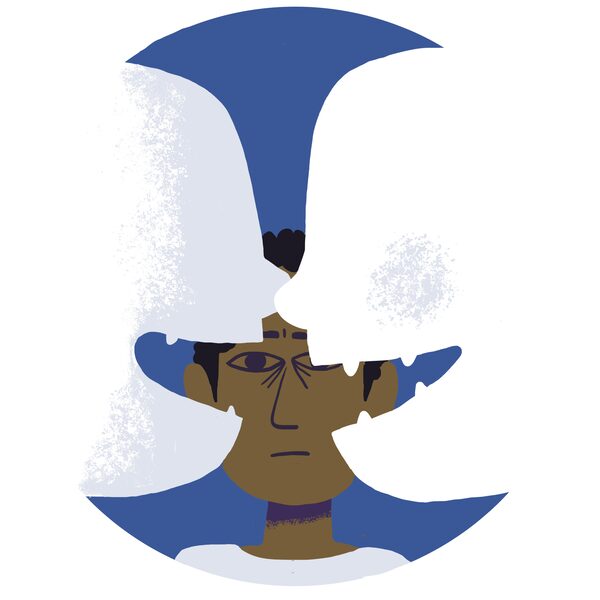
Illustration by Adam De Souza
First Person is a daily personal piece submitted by readers. Have a story to tell? See our guidelines at tgam.ca/essayguide.
We all have this Facebook friend, but they might not all be a family member: The one that shares a lot of posts, nearly every day, sometimes multiple times a day. The posts are on various subjects from updates on their grandkids, from loving and supportive sentiments in general, all the way to angry frustrated opinions. These posts might be political, they might be benign, they can be supportive, but from time to time they are intolerant. This person is family and they sure are stubborn, they don’t like it when you disagree with them. They are your elder and you don’t criticize your elder. So, you usually scroll past the post.
Then the day comes when you don’t scroll on. An intolerant and casually racist post goes too far and you consider unfollowing them. I don’t want that kind of anger in my life. I have unfollowed a couple of people for this reason. But I struggle to click “unfollow." To me, clicking unfollow is equivalent to saying I don’t value my relationship with them and I do value the relationship. They are family and they lived through a time that was different from mine. A time when what I see as racist is not what they see. So, you take a deep breath and scroll on past. I tell myself that they don’t intend to hurt anyone. I know them and I think they are a good person.
I struggled with that decision for some time and then the stars aligned to push me out of that cycle of deep-breaths-and-scroll-on. It happened after I watched a video about casual racism, the type of racism that is not a hate crime and not violent. The type I have scrolled passed and said to myself that the poster didn’t intend to hurt anyone. A shift occurred in my mind when the video noted that violent incidents of racism were often preceded by casual racism, where one person’s action with unintended harm leads to another person committing harm.
After watching the video, I logged on to Facebook and – there it was – a post from that family member sharing what I saw as a racist joke. I know they don’t intend to hurt anyone, but now I think about it differently.
The joke made fun of accents, it poked fun at how it is hard to understand English spoken with accent and it mentions a specific surname as a way to convey tough to understand accents. Knowing now how these posts can lead to real hurt, I comment. In hindsight, my comment was poorly chosen. They were fighting words, they were not constructive words. I wanted to be open to discussion. I wanted to understand why experiences different than mine led to a different conclusion than mine. However, I chose comments that failed to set the right tone. Needless to say, people got mad and no one wanted to hear what I had to say. No one wants to hear they are racist.
I now find myself trying to decide if there is a better route? How do you call out casual racism? Can it even be done? I wonder if the secret to calling out casual racism is not to call it racism. I try to put myself in my family member’s shoes. She is in her 70s. I am in my 30s. Is there a generational issue? I wonder if the word “racism” to my elders means only violent hate crimes. I would be offended, too, if I thought one of my family members thought I was capable of such horrid acts. I wonder if she even thinks jokes can be racist?
Online, I find a posting by the Australian government about casual racism and how to deal with it. The advice encourages anyone who witnesses casual racism to say something. It recommends pulling the person aside and asking them why they choose to speak that way.
When I see the next casually racist post, I wonder if I send my family member a private message, would she respond? I consider opening lines: “Hi. I wonder if you could share more with me about this post?” “Hi. Can you tell me what it is about this post you liked so much?”
They are nice lines. They aren’t combative or judgmental like my first attempt. I think she would answer. But I wonder how to the conversation would go. Am I just setting a trap? And is that ethical of me? In my quest for tolerance, should I just tolerate their different views? The paradox of tolerance is tricky business.
I decided after a couple of days to write my own post. The relevant part went like this:
“I believe that by standing strong about “harmless words” means you stand strongest against harmful actions and therefore those actions becomes unfathomable. I want the future to be a place where racial violence and segregation is truly a thing of the past. I say why not choose inclusivity first? Why not choose words without the stains of injustice?”
My post went over well with many friends, but I could not help but notice the radio silence from that one family member. It is quite possibly the only post of mine she has not liked or commented on.
For now, I will not unfollow her. I will hold my tongue and respect my elder. I will put family first. And I just might silently report their post to Facebook for removal because of racist content.
Larissa Robinson lives in Hamilton.